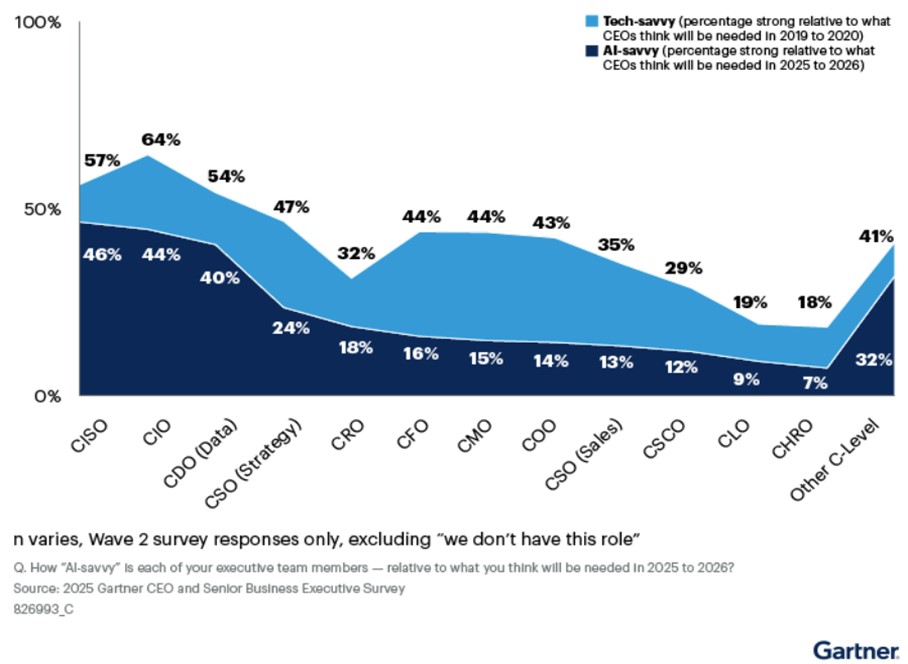Lack of confidence in C-suite comes as CEOs identify AI as the technology that will define the next era of business
Only 44% of the Chief Information Officers (CIOs) are considered by their Chief Executive Officers (CEOs) as “Artificial Intelligence (AI) experts,” according to a survey by Gartner, Inc.. The Gartner CEO and Senior Business Executive Survey of 456 CEOs and other senior business executives worldwide was conducted from June to November 2024 and measured CEOs' perceptions of the C-Suite.
The survey revealed that 77% of CEOs believe that AI is ushering in a new era of business, but feel that their companies’ top technology experts lack the knowledge and resources to support, drive, or accelerate business outcomes in this evolving landscape.
“We have never seen such a disproportionate gap in CEOs’ views on technological disruption,” says David Furlonger, Vice President Distinguished Analyst and Gartner Fellow. “Artificial intelligence is not just an incremental shift in digital business, but rather a radical transformation in the way business and society operate. A significant implication is that if C-Suite knowledge is not rapidly improved, competitiveness will be impaired and corporate survival will be at stake.”
CEOs consider that even CIOs, Chief Information Security Officer (CISOs) and Chief Data Officer (CDOs) lack AI expertise. CEOs’ concern about C-suite technology expertise is not new. Gartner CEO research conducted between 2019 and 2020 showed that CEOs’ assessment of the technology expertise required for the digital age among their executives was suboptimal.
CEOs’ perceptions of C-Suite AI (2025–2026) and technology (2019–2020) knowledge

Source: Gartner (May 2025)
Limiting factors affecting AI implementation
CEOs highlight that the two main limiting factors affecting the implementation and use of Artificial Intelligence are the inability to hire an adequate number of qualified people and to calculate value or results obtained.
“CEOs have shifted their view of AI from just a tool to a transformative way of working,” he says. Jennifer Carter, Principal Analyst at Gartner. “This shift has highlighted the importance of upskilling. As leaders recognize the potential of AI and its impact on their organizations, they understand that success is not just about hiring new talent. Instead, it’s about equipping their current employees with the skills needed to seamlessly incorporate AI into everyday tasks.”
This focus on upskilling is a strategic response to AI’s evolving role in business, ensuring that the entire organization can adapt and thrive in this new paradigm. Sixty-six percent of CEOs said their business models are not fit for AI, according to the survey. Executives must therefore develop and enhance AI expertise related to each mission-critical priority.
Gartner customers can read more at “2025 CEO Survey – The Year of Dynamic Capacity”. Additional details can also be found in Gartner’s free webinar “CIOs: 4 Key Elements to Accelerate Your CEO's 2025 Growth Agenda.”
About Gartner for Information Technology Executives
O Gartner for Information Technology Executives provides actionable, objective insights for CIOs and IT leaders, helping them lead their organizations through digital transformation and drive business growth. For more information, visit: www.gartner.com/en/information-technology. Follow the news and updates of Gartner for Information Technology Executives at the X and in LinkedIn using #GartnerIT. Visit the news room for more information and insights.
About Gartner
O Gartner, Inc. delivers objective, actionable insights to executives and their teams. Our expert guidance and tools enable faster, smarter decisions and better performance for your business’s mission-critical priorities. To learn more, visit www.gartner.com.













